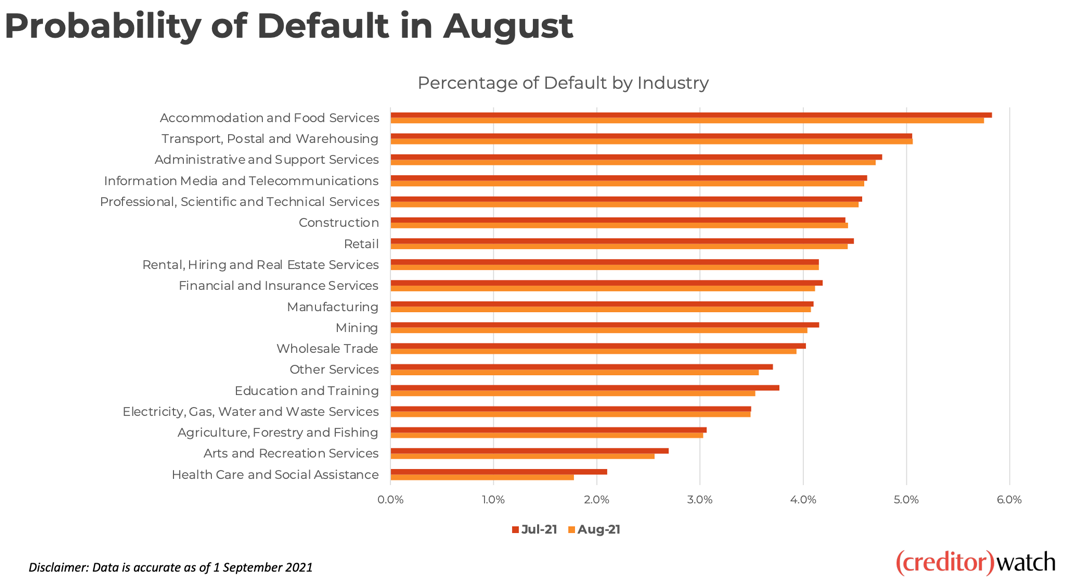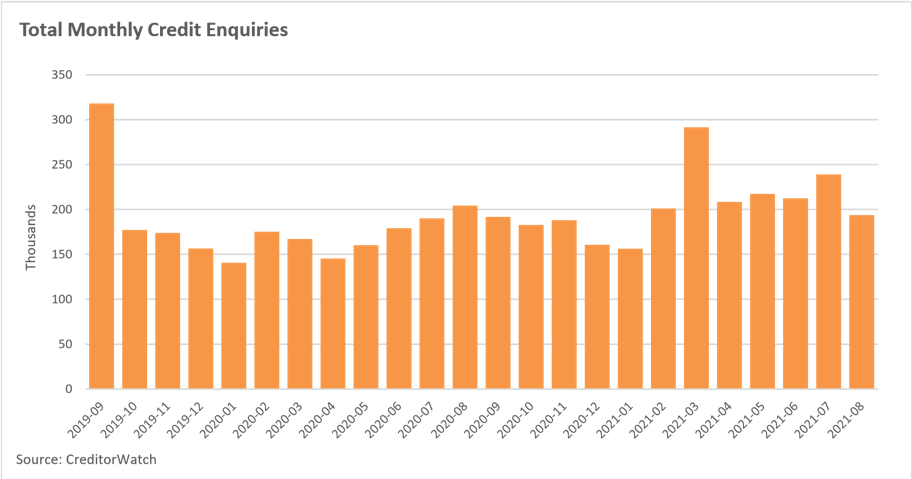COVID lockdowns have hit Australian businesses hard, according to the latest CreditorWatch August Business Risk Review data.
The August results reveal that throughout lockdown, many businesses ceased trading or sat sit in a holding pattern until economic conditions improved and become more certain, as reflected in CreditorWatch’s data for August which showed a 12.5 per cent month-on-month drop in trade receivables.
In another sign that business activity has slowed, credit enquiries for August were down 19 per cent from July to August and 5.2 per cent year-on-year, the first negative result since September last year.
The number of court cases jumped by 35 per cent in August indicating again that pressure has come to bear on many businesses.
“Despite state government support packages, it is obvious that continuing uncertainty about the path out of lockdowns has impacted business confidence,” said Patrick Coghlan, CreditorWatch CEO.
“Many businesses are struggling to trade through lockdowns or are unable to trade at all,” he said, “At this point, cash reserves are dwindling and yet credit enquiries have slumped. This is a very concerning scenario for the Australian economy.”
CreditorWatch Chief Economist, Harley Dale, noted that while credit defaults were steady over 2021 and external administrations fell heavily over July and August, this was likely to reverse once lockdowns are over.
“We’re really in an artificial economy due to the lockdowns; it’s not a normal trading environment. So, it’s important to view this month’s Business Risk Review in that context,” he said.
“It’s likely the full impact of the lockdowns will play out in CreditorWatch data later in the year,” he added.
Default numbers stable
The number of business defaults is a leading indicator of commercial risk, and the monthly CreditorWatch Business Risk Review provides revealing insights.
The Accommodation and Food Services industry – encompassing liquor retailing, cafés and restaurants, clubs and pubs – has the highest percentage probability of default. This is defined as the likelihood that an entity will NOT be able to meet their financial commitments in the next 12 months eg: pay an invoice.

Looking more broadly, the number of defaults rose by 0.6 per cent in August 2021 when compared to the same month last year. Although the increase was small, it represented the first rise in defaults since May 2020.
Flat default numbers seem counterintuitive given lockdowns and stay-at-home orders. There are a number of explanations for this. Trade receivables are down given many businesses are unable to trade, which helps to lower defaults. Many creditors, especially those trading with businesses in hot spot LGAs, are working with their debtors to help them through this time, which also has an impact on default numbers. Additionally, the ATO and banks are taking a benign approach to businesses whose turnover has suffered due to lockdowns, except for those businesses that are gaming the current system, which the ATO is keeping a close eye on.
However, as extended lockdowns persist, defaults are expected to increase.
Credit enquiries slide
While credit enquires are up by 12 per cent over the three months to August this year when compared to the same period in 2020, they fell by 19 per cent in August 2021, on a non-seasonally adjusted basis. On an annual basis the number of enquiries fell by 5.2 per cent, the first negative result since September last year.
The CreditorWatch credit enquiries metric is a leading indicator of business health. This result highlights the impact lockdowns are having on Australian businesses.

Court cases spike
The number of court cases jumped by 35 per cent in August, on a non-seasonally adjusted basis, with a three per cent rise in court cases on an annual basis, the first rise since March 2020. The number of court cases is four per cent higher over the three months to August 2021.
On an annual basis, court cases are down by 19 percent over the three months to August this year compared to the same period in 2020. Once lockdowns end, court cases could rise sharply.
For the Accommodation and Food Services industry, court cases trebled from July 2021 to August 2021 but are still down by 16 per cent when compared to August 2020.
External administrations
The number of external administrations has fallen heavily over July and August 2021, although these numbers are not seasonally adjusted. Administrations fell by six per cent over the three months to August compared to the three months to May. External administrations increased by six per cent compared to the three months to August 2020.
As lockdown restrictions ease the number of external administrations will inevitably rise.
Outlook
For many businesses, the trading environment is difficult at best. State government support packages are vital lifelines for affected firms during this period.
The business community is crying out for definitive guidance from state and federal governments about the re-opening schedule and state and international borders reopening.
CreditorWatch is urging federal and state governments to give businesses more certainly about when the economy will re-open in full and the stages and milestones required to achieve this.